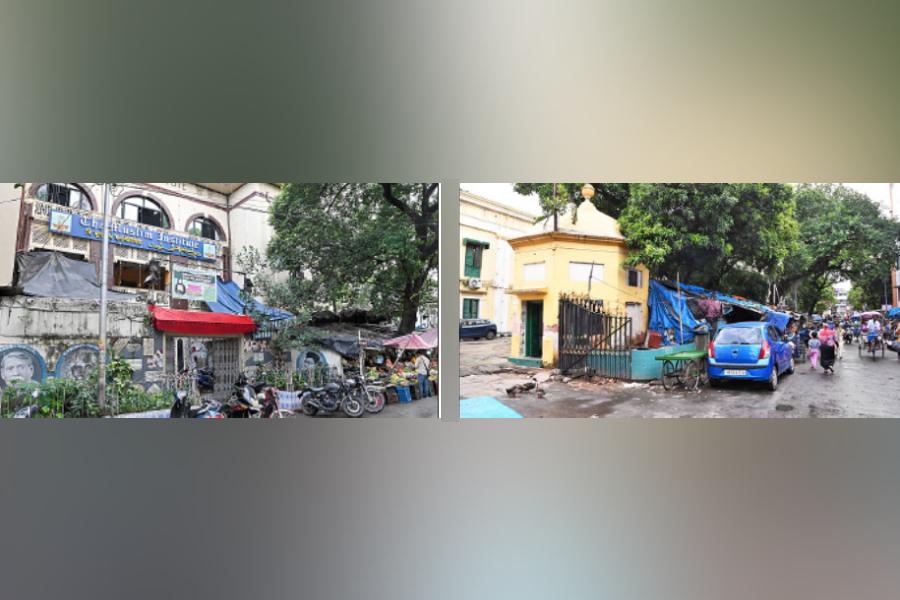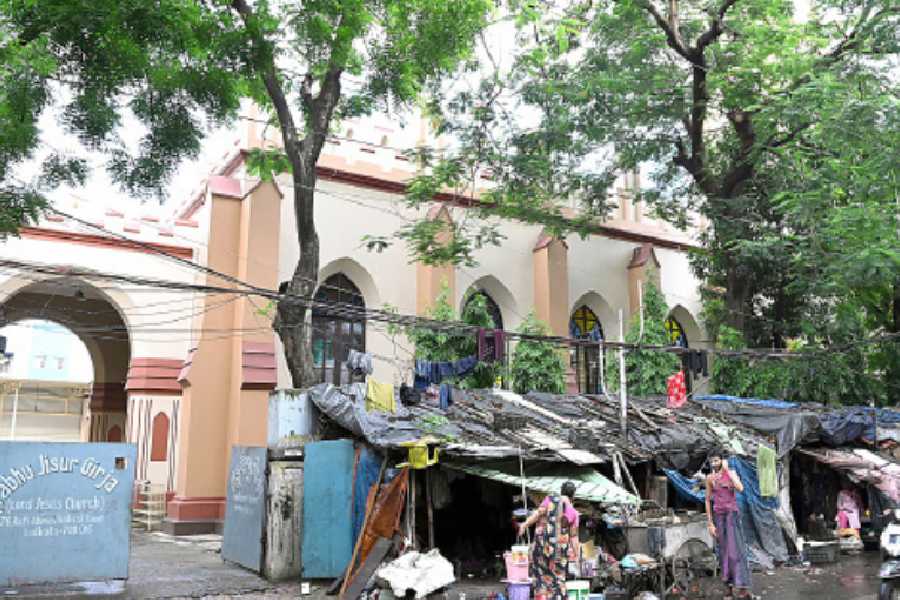Several historic institutions in the heart of the city, great bearers of its secular and cosmopolitan legacy, are fading into oblivion because of the scourge of illegal encroachment.
A stretch of Taltala, both sides of Rafi Ahmed Kidwai Road and the area around Haji Mohammad Mohsin Square are dotted with numerous shanties and stalls selling everything from bidi to biryani.
A 242-year-old madrasa and a 175-year-old church are two of several historic institutions trapped by encroachments. The Calcutta Madrasah, Lord Jesus Church, Muslim Institute, Elliot and Baker Hostels and the new girls’ hostel of Maulana Azad College are caught up in a mesh of stalls and shanties.
“The sanctity and prestige of these institutions get defiled due to this blatant broad daylight encroachment with the local civil and police administration looking the other way. The mushrooming of the illegal encroachers is not only a civic nuisance but a blot on the shared cultural heritage of our great city in terms of our inability to preserve the legacy of our history and cultural symbolism,” a forum of representatives of these institutions said in a note shared at a news conference on Wednesday.

Stalls in front of the Muslim Institute and (right) the Calcutta Madrasah
Metro found scores of structures made of bamboo poles, tarpaulin, and tin and plywood sheets on the pavements. The stalls sold fruits, fruit juice, biryani, chhole bhature, cakes, biscuits, soft drinks, cigarettes, handkerchiefs and the likes.
Homes, made of tarpaulin sheets and the occasional tin shade as roofs, were everywhere on the pavements. Clothes were left hanging in the sun for drying and plastic chairs were kept outside.
Not only did the structures completely occupy the pavements, curbing the right of citizens to free movement, they lent an ugly look that was unbecoming of an area boasting such historic edifices.
Wednesday’s press conference was held at Chitrabani, in the Lord Jesus Church compound. The centre for film studies was founded by Father Gaston Roberge with the help of Satyajit Ray in 1970.
Roberge, a Jesuit priest-turned-film academic from French-speaking Montreal, who arrived in Calcutta in 1961 and lived here until his death in 2020, is considered the doyen of film studies in the city.
“The encroachments have now become a nightmare to not only the people attached to these encroached institutions but also to the larger communities in and around the area who are commuters using the road for their daily purposes,” the campaigners’ note says.
“The problem of encroachers goes back 20 years. But the scale has multiplied in the past decade or so. With an increase in the number of structures, the volume of litter goes up. Many of the encroachers urinate on a portion of the boundary wall of the church,” said Father Kurian Emprayil of Lord Jesus Church, a Jesuit parish that counts over 400 families as followers.
“The church was built in 1848,” he said.
A stone’s throw from the church stands a leading centre of Islamic education during the British era.
The Calcutta Madarsah was founded by Warren Hastings in 1781. In his “Minute on Madrasa”, Hastings said he had been approached by a number of Muslim men of “credit and learning” to set up a madarsa in Calcutta, as the city had “already become the seat of a great empire”.
Since 2007, the institute has been a part of the Taltala campus of Aliah University, housing the theology and Arabic departments. Around 1,200 students — undergraduate and postgraduate — attend classes there.
The Muslim Institute — which came up in 1902 — now runs a tutorial, library and a computer learning centre and a gymnasium, besides squads in cricket, football and other sports. Father Kurian of the Lord Jesus Church; Nisar Ahmed, general secretary of the Muslim Institute; Tajdaar Ali Meerza, superintendent of Elliot Hostel; and Tanweer Ahmed Khan, secretary, Maulana Azad College Alumni Association, were among those present at the news conference.
On Wednesday, they accused the civic body and the police administration of inaction.
“We had written to the mayor and the police commissioner of Calcutta in November 2022. But there has been no action so far,” said Ahmed, himself a former police officer.
Mayor Firhad Hakim told this newspaper: “I had forwarded this letter to the police, asking them to take action. New hawkers have to be reigned in. How many new hawkers can be rehabilitated?”
A senior officer at Lalbazar said: “I have to check. I cannot comment on this specific matter without ascertaining the details. But we conduct anti-encroachment drives on a regular basis.”
In Calcutta, illegal encroachments have often been linked to political patronage. But it is not every day that the encroachers block free access to and around buildings of historical importance.
In October 2022, this newspaper had reported how hawkers selling Diwali illuminations took over the Parsi Fire Temple Street, off Rabindra Sarani.
